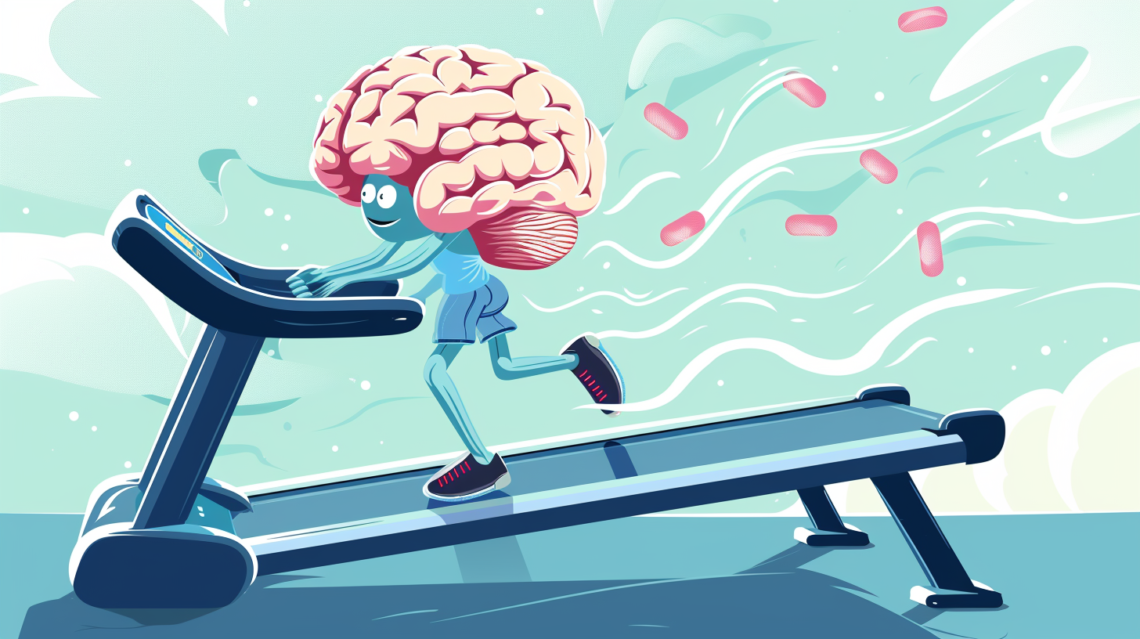-
The Impact of Exercise on Brain Health
The correlation between physical exercise and the enhancement of brain health emerges as a subject of paramount importance, engaging the interest of both the scientific community and the general populace. This intricate relationship underscores the notion that engaging in regular physical activity is not solely beneficial for the physical body but also acts as a pivotal catalyst in the promotion of cognitive health, mental wellbeing, and overall neurological resilience. The benefits of exercise extend far beyond the confines of physical fitness, weaving into the fabric of mental acuity, emotional stability, and neuroprotective mechanisms that safeguard against degenerative diseases. Central to understanding this relationship is the acknowledgment of exercise-induced neuroplasticity, a…
-
Migraines and Headaches
In the intricate and multifaceted realm of neuroscience and mental health, migraines and headaches stand out as two of the most common yet profoundly debilitating conditions that affect millions of individuals across the globe, including a significant portion of the Canadian population. These conditions, characterized by intense and often incapacitating pain, are not merely simple annoyances but rather complex neurological disorders that can have a profound impact on the quality of life of those afflicted, influencing their ability to work, engage in social activities, and perform daily tasks. Migraines, in particular, are distinguished by their severe and pulsating nature, typically affecting one side of the head, and are often accompanied…
-
Understanding and Managing Anxiety
Anxiety, a multifaceted and pervasive condition, affects countless individuals worldwide, weaving a complex tapestry of psychological, physiological, and behavioural symptoms. Its manifestations are as varied as the people it affects, spanning from subtle psychological nuances to overwhelming physical sensations, thereby impacting every facet of an individual’s life. Anxiety, in its essence, is a natural response to stress, serving as an evolutionary alarm system that alerts us to potential dangers. However, when this response becomes hyperactive, it transcends its protective purpose, evolving into a relentless force that can severely disrupt daily functioning and overall wellbeing. Manifestations of Anxiety Anxiety materializes through a spectrum of symptoms, each varying in intensity and frequency.…
-
Prioritizing Women’s Health
On this International Women’s Day, as the world comes together to celebrate the achievements and progress of women in various spheres of life, it becomes imperative to shine a light on a critical aspect often sidelined in the hustle and bustle of daily commitments—health. The health of women, with its unique complexities and nuances, demands attention, understanding, and prioritization, not just as a matter of personal well-being but as a cornerstone of societal growth and sustainability. Women, inherently multifaceted in their roles as professionals, caretakers, educators, and leaders, find themselves navigating the challenging waters of balancing these responsibilities with their health needs, a task that, though daunting, is crucial for…
-
The Importance of Good Nutrition
In the realm of maintaining optimal health and well-being, the significance of good nutrition cannot be overstated. It serves as the foundation upon which our bodies build strength, immunity, and overall vitality. This extensive article delves into the multifaceted benefits of good nutrition, outlines how it can profoundly impact our health, and provides examples of foods that epitomize healthy eating. Utilizing insights from nutritional science, we aim to elucidate how dietary choices can influence our physical and mental health, underscoring the importance of informed food selections in our daily lives. Understanding Good Nutrition Good nutrition involves the intake of a balanced diet rich in vitamins, minerals, proteins, carbohydrates, and fats,…
-
Sleep’s Impact on Productivity
The intricate interplay between sleep and productivity is a subject of paramount importance that has garnered substantial attention in both academic and professional circles, particularly within the context of its ramifications on academic and workplace performance. In an era where the pursuit of excellence in both educational and professional spheres is incessantly emphasized, the deleterious effects of sleep deprivation on productivity emerge as a critical concern, meriting a thorough exploration and understanding. This article delves into the multifaceted ways in which inadequate sleep detrimentally impacts one’s ability to function optimally in educational and work environments, elucidating the underlying mechanisms through a comprehensive examination of relevant scientific findings and empirical evidence.…
-
The Mental Cost of Sleep Loss
Lack of sleep, or being abruptly awakened from sleep, is not merely a minor inconvenience or a fleeting discomfort. It holds profound implications for mental health, affecting mood, cognitive functions, and overall well-being in ways that are both complex and significant. The intricate dance between sleep and mental health is a subject of increasing interest and concern within the medical community, particularly given the modern lifestyle’s penchant for undermining traditional sleep patterns. This article delves into the multifaceted effects of sleep deprivation and disruption on mental health, with a special focus on mood disturbances and the implications for individuals with pre-existing health conditions or those awaiting medical procedures, such as…
-
Understanding Eating Disorders
Eating disorders, complex conditions that intertwine both psychological and physical aspects of health, emerge from a confluence of genetic, environmental, and social factors, manifesting in harmful eating behaviours that can severely impact an individual’s well-being. These disorders are not merely about food but often reflect deeper issues related to self-esteem, control, and coping mechanisms for dealing with stress and emotional pain. Among the most common types are anorexia nervosa, bulimia nervosa, and binge-eating disorder, each presenting unique challenges and risks to health, necessitating a nuanced understanding and approach to treatment and support. Anorexia nervosa is characterized by an intense fear of gaining weight and a distorted body image, leading individuals…
-
Rare Disease Spotlight: Chronic Progressive External Ophthalmoplegia
Chronic Progressive External Ophthalmoplegia (CPEO) is a debilitating condition primarily characterized by the gradual loss of eye muscle function and eyelid movement, affecting either one or both eyes. This condition, which typically commences between the tender ages of 18 and 40, manifests through a series of symptoms that severely impair the quality of life of those affected. Among the most prominent symptoms are weakness or paralysis of the eye muscles, known medically as ophthalmoplegia, and droopy eyelids, referred to as ptosis. These symptoms not only hinder the physical aspects of eye movement but also contribute to a range of emotional and psychological stresses, as the affected individuals grapple with the…
-
Pink Shirt Day: Bullying’s Mental Health Focus
Pink Shirt Day, celebrated annually in Canada and across the globe, stands as a vibrant testament to the collective resolve against bullying—a pervasive issue that transcends the confines of playgrounds and permeates schools, workplaces, homes, and the digital realm. Originating from a Canadian act of solidarity when two students, Travis Price and David Shepherd, rallied their peers to don pink shirts in support of a fellow student bullied for wearing pink, the day has evolved into a global movement. It underscores the importance of community action in confronting bullying, advocating for kindness, and fostering environments where respect and empathy prevail. This initiative not only highlights the social and emotional toll…









